7 surprising reasons you can’t sleep through the night
You probably knew about the effects of having caffeine late in the day. But what about these other causes of sleeplessness?
Updated on October 10, 2024
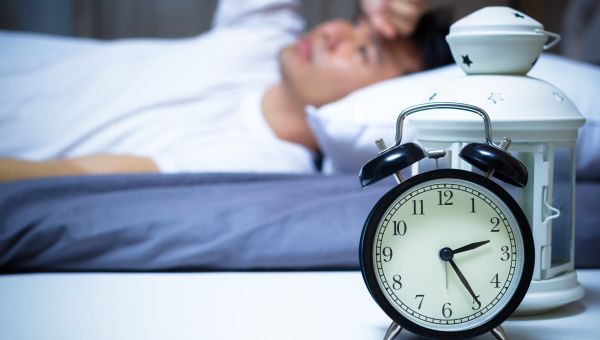
Are you great at falling asleep at night, but not so great at staying asleep? You might know that certain things, such as caffeine, alcohol, depression, stress, and smartphone use can affect your shut-eye. But you may not be aware that other, lesser-known factors can also interrupt your sleep, including some medications, your room setup, and even your pet.
Never fear. You can get the rest you need. Here are seven surprising things that may be causing your sleep issues, plus ways to get back to bed.

You’re taking certain medications
Some drugs, like decongestants, may cause a variety of sleep complications, such as waking up in the night, trouble getting to sleep, or daytime drowsiness.
“It’s common to reach for the decongestants when you have a cold or you’re congested, but these types of medications are actually stimulants,” says Robert Grant, DO, a sleep medicine specialist and pulmonologist in Garden City, Michigan.
Here are some other medications that may cause sleep issues during the night:
- Beta-blockers and diuretics for high blood pressure
- Corticosteroids for inflammation or asthma
- Nicotine replacements
- Selective serotonin reuptake inhibitors for depression or anxiety
If you’re having problems sleeping and you’re taking one of these medications, see your healthcare provider (HCP). The solution may be as simple as reducing your dosage or transitioning you to a different prescription.
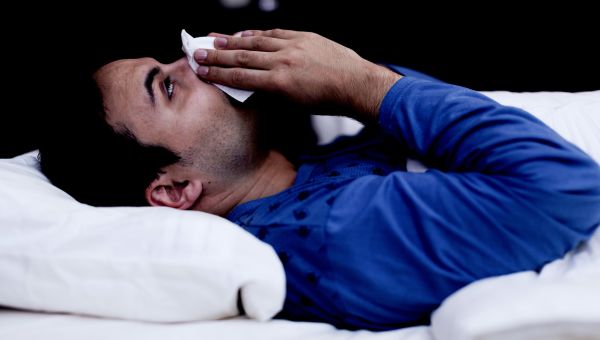
You have allergies
“People who have allergic rhinitis or nasal allergies, especially in the spring or the fall, may have difficulty breathing at night,” says Dr. Grant. Since allergies cause congestion, it’s possible you’ll wake up or snore.
Over-the-counter medications like antihistamines may help symptoms, but it’s important to discuss options with your HCP, since some drugs can aggravate sleep issues. As a potential alternative, steroid nasal spray may alleviate congestion and help you sleep.

You live in a big city
If you live in a noisy city, you may think you’re used to honking, car alarms, sirens, and other street noises. But those disturbances could be waking you up in the middle of the night and you might not even realize it.
“People who live in the inner cities tend to have more issues in the night, and are more sleep deprived than people in rural environments,” says Grant.
Grant says noise-canceling headphones or white noise can distract you from the racket outside and provide a sense of calm. White noise is a combination of noise frequencies that together provide a steady background hum. Pink noise may also help: These are sounds with a consistent frequency that often simulate nature sounds—think crashing ocean waves, a steady stream of running water, or falling rain. Just make sure your machine isn’t too loud. Turning it to a lower volume is best.
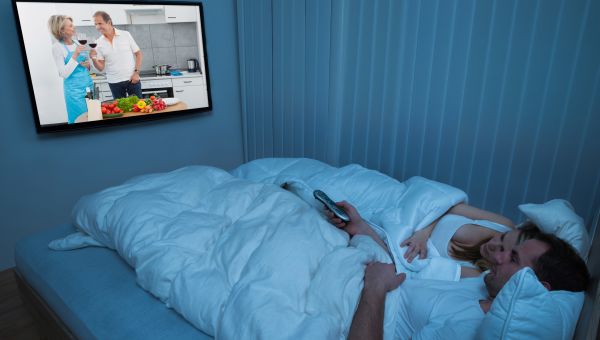
You’re listening to music or the TV
Blasting your favorite tunes or leaving the television on to sleep isn’t a good idea, says Grant. That's because when you're dozing, your brain still registers and processes sounds. “These noises stimulate your brain, and if you fall asleep with them on, you’re probably going to wake up during the night when you naturally enter a lighter stage of sleep,” Grant says.
A quiet room is best, but noise-canceling devices and white and pink noise are both okay if you need a little something on in the background.
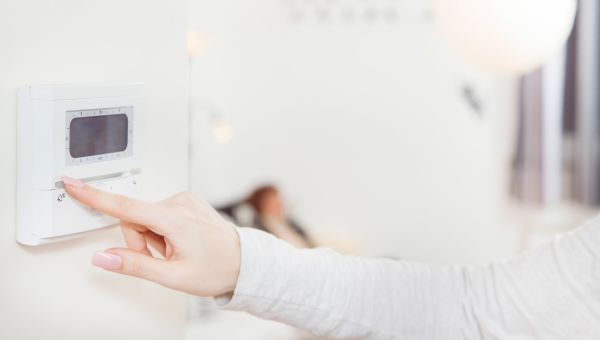
Your bedroom is too warm
It’s hard to sleep when you’re hot—and there’s actually some science behind why. “When you go to sleep, your body temperature is higher,” says Grant. "Throughout the night your body temperature will drop to what we call the core level, or the lowest it’s going to be." Your core temperature is typically at its lowest point about two hours before your normal wake-up time. If your room is too warm, you won’t be able to reach that level. That may interfere with your circadian rhythm, or body clock, and cause you to wake up.
Make sure to set your room temperature between 65 and 68 degrees Fahrenheit. It sounds chilly, but it’s better to be cold and bundle up than to be warm and wake before you want to. Your sheets matter, too. According to the Sleep Foundation, bamboo sheets are moisture-wicking, lightweight, and breathe well, all of which can help keep your body temperature down.
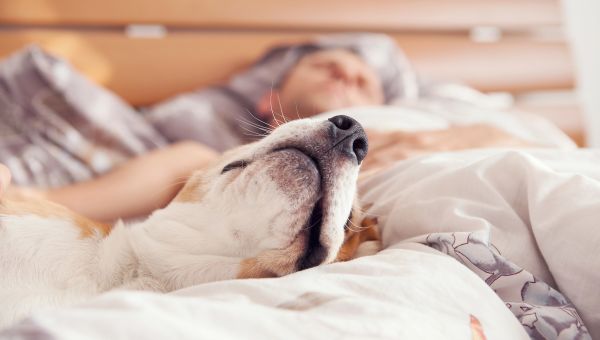
You snuggle up with Fido at night
The 2021-2022 American Pet Products Association National Pet Owners Survey showed that nearly half of dog and cat owners allow their pups to sleep in bed with them. And while cuddling may comfort you and lower your stress levels, Dr. Grant says it’s not a good idea. If your cat or dog wakes up scratching, barking, meowing, or moving around, it can wake you up, too. If you have asthma or allergies, your pet can make congestion and coughing worse.
If you don’t have allergies or asthma, having the family feline in your room is fine, says Grant, but it should be on the floor (and if you have a dog, the crate is fine, too). Just be sure to give your fluffy pal extra attention the next morning.
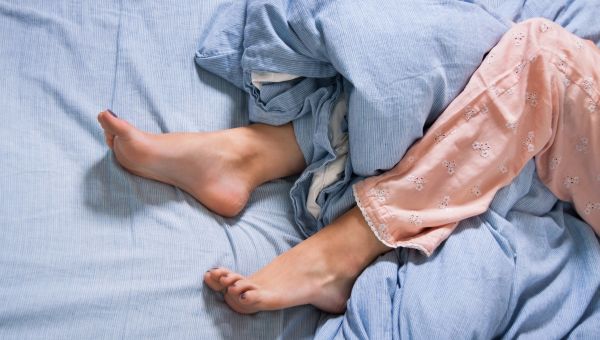
You have a health condition
In addition to well-known sleep disorders like apnea and insomnia, some medical conditions can cause nighttime problems. “Parkinson’s patients have excessive limb movements called leg motor restlessness during the night, so their sleeping tends to be on the lighter side,” says Grant. Noise caused by tremors, as well as dreams or nightmares triggered by levodopa medication, can also interrupt sleep for those with Parkinson’s disease.
Along with exercise and a regular sleep schedule, Parkinson’s patients can work with their HCP to adjust medication dosage or to discuss whether melatonin supplements or prescription sleep aids should be added to their diet.
Menopausal and postmenopausal women may have sleep issues, too. “After a woman goes through menopause, sometimes we see an increase in symptoms of restless leg syndrome (RLS),” says Grant. Hot flashes can also disturb sleep.
RLS could indicate an iron or vitamin deficiency, says Grant, so your HCP may recommend increasing your intake of iron, vitamin B12, or folate. Simple lifestyle changes like cutting down on caffeine and alcohol are also recommended.

Harvard Health Publishing. Are your medications keeping you up at night? December 1, 2022.
Riemer TG, Villagomez Fuentes LE, Algharably EAE, et al. Do β-Blockers Cause Depression? Hypertension. 2021;77:1539-1548.
Cole JL. Steroid-Induced Sleep Disturbance and Delirium: A Focused Review for Critically Ill Patients. Fed Pract. 2020;37(6):260-267.
American Cancer Society. Nicotine Replacement Therapy to Help You Quit Tobacco. Updated August 2, 2021.
Wichniak A, Wierzbicka A, Walęcka M, et al. Effects of antidepressants on sleep. Curr Psychiatry Rep. 2017;19(9):63.
Medline Plus. Nasal corticosteroid sprays. Last reviewed October 30, 2021.
National Science Foundation. Day or night — your brain is always listening. Updated August 25, 2022.
Cleveland Clinic. Can Pink Noise Help You Sleep? April 28, 2022.
Centers for Disease Control and Prevention. Improve Sleep: Tips to Improve Your Sleep When Times Are Tough. Updated June 29, 2020.
American Pet Products Association. 2021-2022 APPA National Pet Owners Survey. Accessed December 16, 2022.
Bohnen NI, Hu MTM. Sleep disturbance as potential risk and progression factor for Parkinson's Disease. J Parkinsons Dis. 2019;9(3):603-614.
National Institute on Aging. Sleep Problems and Menopause: What Can I Do? Content reviewed September 30, 2021.
National Institute of Neurological Disorders and Stroke. Restless Legs Syndrome Fact Sheet. Last reviewed on October 3, 2022.
More On


video

article
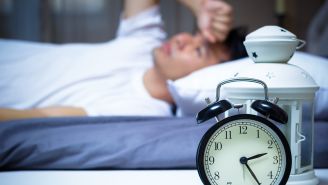
slideshow


video


video
